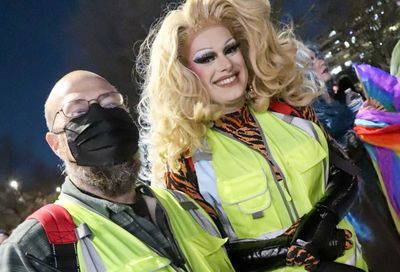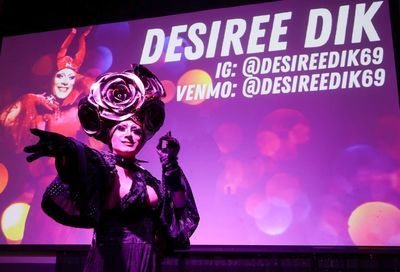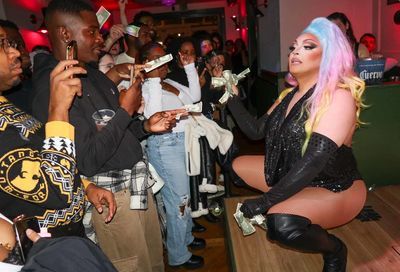Rea Carey at Creating Change: “We Are Not A Single-Issue Movement”
[Photo: Rea Carey at the 2012 Creating Change conference. (Photo by Michael Maldonado.)]
During her State of the Movement Address at the 2012 Creating Change conference this afternoon, National Gay and Lesbian Task Force (NGLTF) executive director Rea Carey emphasized, “We are not a single-issue movement,” effectively warning activists and media creators against focusing singularly on marriage equality at the expense of other equality issues affecting people of color, students, immigrants, the homeless, unemployed, and transgender citizens — “the very base of the progressive movement.”
She began by comparing the LGBT movement to Elphaba, the widely-despised witch from the musical Wicked who is reviled by the public and yet defies an oppressive government.
Noting this last year’s political victories — including the repeal of “Don’t Ask, Don’t Tell,” the legalization of marriage equality in New York and the passage of transgender employment protections in Connecticut, Hawaii, Nevada and Massachusetts — she highlighted the other significant changes in federal policy that came about in part, she said, thanks to partnerships made between politicians and the NGLTF’s 26-organization strong campaign known as the New Beginning Initiative.
Among these victories, she mentioned the national directives extending pubic housing, house loans and hospital visitation rights to LGBT families; de-prioritizing the deportation of LGBT spouses and ensuring care for transgender veterans.
She also highlighted the enormity of Hilary Clinton’s United Nations declaration that “gay rights are human rights and human rights are gay rights,” and Obama’s statement that “We consider LGBT families to be families.”
Moving on to marriage equality, Carey said, “Since the repeal of ‘Don’t Ask, Don’t Tell,’ people think our movement is about one thing and one thing only — marriage,” but then added, “The LGBT movement is not a movement for marriage only … we are in the movement for the full dignity of our lives. The challenge is, when the LGBT movement is framed by the media and seen by others as a single-issue, marriage-only movement, it limits what we can achieve.”
Once LGBT people achieve full marriage equality around the U.S., Carey said, a huge part of the current movement will become politically disengaged. Carey noted that despite the historic decision of Roe v. Wade, the women’s movement still has had to stay engaged to stave off attacks on abortion and reproductive rights in states like Mississippi, where activists help defeat a so-called “personhood” measure that would have outlawed the termination of any fertilized egg cell.
However, Carey also said that “we want more than marriage” noting the elimination of discrimination, violence, bigotry, systemic racism and sexism, as well as unfair housing and immigration laws that continue to disproportionately harm LGBT citizens.
 Toward this end, she declared that the movement’s immediate sights fall on ending the abuse of transgender immigrant detainees, obtaining equal benefits for same-sex military spouses, trans-inclusion in the military and combatting the rising AIDS infection rates for gay, bisexual and men of color concomitant with the decrease in AIDS services and funding.
Toward this end, she declared that the movement’s immediate sights fall on ending the abuse of transgender immigrant detainees, obtaining equal benefits for same-sex military spouses, trans-inclusion in the military and combatting the rising AIDS infection rates for gay, bisexual and men of color concomitant with the decrease in AIDS services and funding.
“Progress for some is not progress for all,” Carey said. “We will not stop until we are all fully free.”
She concluded the speech by focusing on the 2012 elections. Though the LGBT community will need to actively rebuff the falsehoods spread by anti-queer political forces, she stated, the right wing knows it can no longer compete by simply whipping up the socially conservative base.
Rather, she said, the right wing has focused its attention on voter suppression measures “taken right out of the Jim Crow playbook” seeking to disenfranchise the very populations most likely to support progressive measures — namely the impoverished, unemployed, elderly, immigrants, students and people of color.
Highlighting the many voter suppression measures already instated in the South, she added that it is no coincidence that a dozen new voter suppression measures will be in play in the next two years in states like New Jersey, Maine, Minnesota and North Carolina which are currently considering revisions in marriage equality laws.
If we do not protect the people’s right to vote, she said, measures on immigration, non-discrimination, affirmative action and marriage will both fail and eventually weaken.
She concluded by calling on all LGBT people to help “occupy the vote” by registering all potential voters and offering rides to the polls. Should one face voter suppression, she suggested casting a provisional ballot, documenting and sharing the story online and then alerting the civil rights division in the Department of Justice.
[CORRECTION: Transgender employment protections were introduced, but not passed, in the Maryland legislature in 2011.]
[Photo: Carey (Photo by Todd Franson.)]
Support Metro Weekly’s Journalism
These are challenging times for news organizations. And yet it’s crucial we stay active and provide vital resources and information to both our local readers and the world. So won’t you please take a moment and consider supporting Metro Weekly with a membership? For as little as $5 a month, you can help ensure Metro Weekly magazine and MetroWeekly.com remain free, viable resources as we provide the best, most diverse, culturally-resonant LGBTQ coverage in both the D.C. region and around the world. Memberships come with exclusive perks and discounts, your own personal digital delivery of each week’s magazine (and an archive), access to our Member's Lounge when it launches this fall, and exclusive members-only items like Metro Weekly Membership Mugs and Tote Bags! Check out all our membership levels here and please join us today!





















